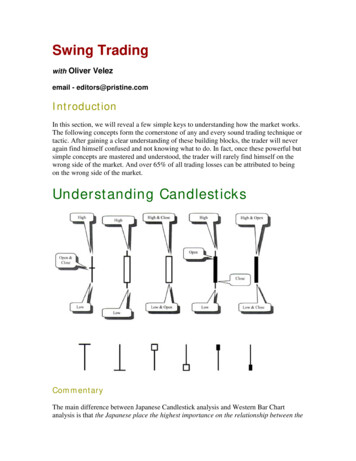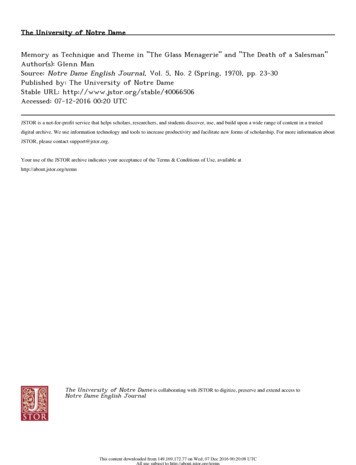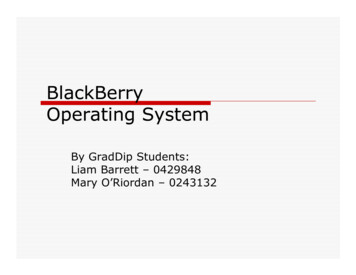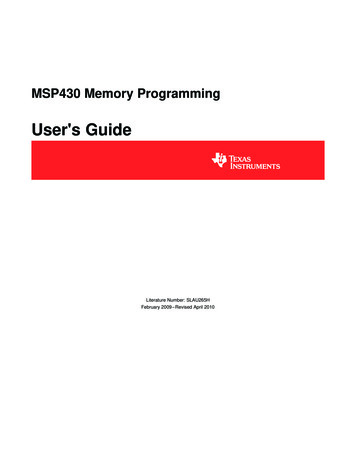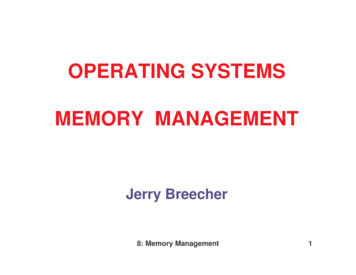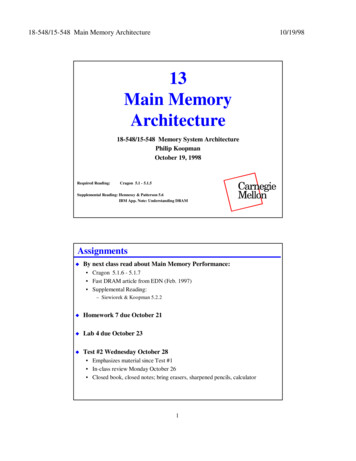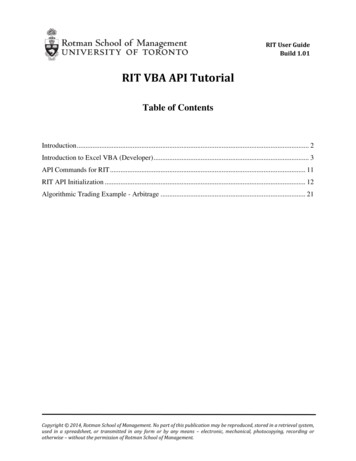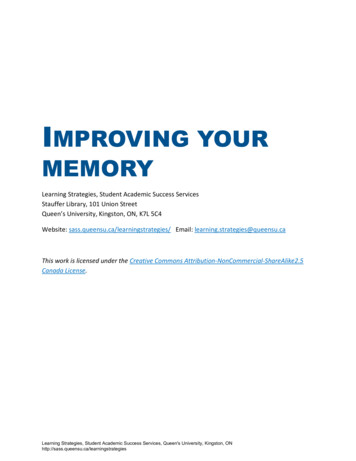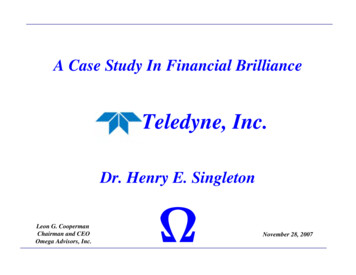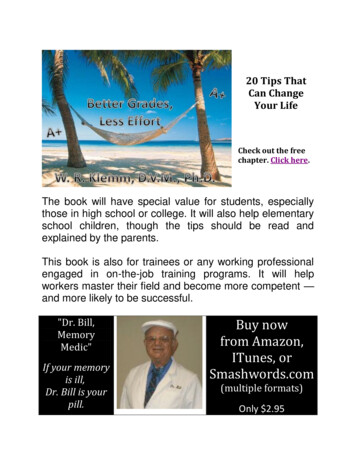
Transcription
20 Tips ThatCan ChangeYour LifeCheck out the freechapter. Click here.The book will have special value for students, especiallythose in high school or college. It will also help elementaryschool children, though the tips should be read andexplained by the parents.This book is also for trainees or any working professionalengaged in on-the-job training programs. It will helpworkers master their field and become more competent —and more likely to be successful."Dr. Bill,MemoryMedic"If your memoryis ill,Dr. Bill is yourpill.Buy nowfrom Amazon,ITunes, orSmashwords.com(multiple formats)Only 2.95
If you won't invest the cost of a burger in your future,what does that say about your future?PublicationsWhat Good is Learning if You Don’t' Remember it?Memorization: It's Not a Dirty WordWhat Stress Does to Mental CapabilityTechnology Breeds Self-absorbed KidsNews ReleasesPut Old on HoldCity newspaperTexas A&M College Newspaper WellsphereReviewsAt Amazon:By john cook - See all my reviews star star star star star starThis review is from: Better Grades. Less Effort (Kindle Edition)There is so much information available these days you doubt which books you should read. Thisbook is one that you should read as early as possible. Learning how to successfully learn andmemorize what you have learnt are essential skills. Better grades gives you a simple ,easy tounderstand roadmap that you can use over and over again throughout your life.The return on investment of time, money and effort will pay handsomely in future years.Many students take little time or thought to how they learn and study. Better grades showsthat rote learning is not the most successful method.
Better Grades offers you the roadmap to successful learning with key points which includememory mapping to facilitate memory and taking a window of time for learning consolidation.Easy to understand and implement and well worth your investment in your success.At Smashwords:Review by: Alex Lopez on Nov. 15, 2012 : star star star star starSurprised at how well it captures the readers emotions and manages to keep the readerinterested in the book. Keeping in thought that you're usually reading this book to improveyour focus and concentration this book manages to keep you entertained and several of theteaching methods including the pictures make this a gem to any student or worker.Review by: Sharon A. Mitchell on March 20, 2012 : star star star star starExcellent book! Dr. Klemm's style is reading, lively and interesting throughout. While otherreviewers have recommended this book for college and high school students, I'd add teachersto the list. If educators knew more about these strategies, they could help their studentsacquire the skills to raise their grades without as much extra effort as they might think. Also, Dr.Klemm's book puts into plain language the current research into brain-based learning thateducators are trying to put into practice.This book will not only help students, but adults in their workplace as they try to keep pace withadvancements in their field.(reviewed within a month of purchase)Review by: Mitch on June 07, 2011 : star star star star starExcellent Book, for the motivated learner of any age. The information provided gives a clearrationale for why people in the US need to move past the mythology of 'talent' and movetoward effort/practice/strategic learning to excel.
I used similar methods to good effect, but this e-book consolidates what took me years todiscover through studying psychology, neuroscience, biology.too bad I didn't get to read thisbefore my college career, rather than at the end of it. Thanks for the excellent resource andmaking it interesting and understandable--rather than some of the other info I have read thatoften comes off as gimmicky and does not present and research data to help validate it.Mitch(reviewed the day of purchase)Review by: Gregg Young on Dec. 30, 2010 : star star star star star“Better Grades, Less Effort” is a concise and compelling read. It is one that every high schooland college student should read and apply. Dr. Klemm writes in a very readable style, coverseach point clearly, includes examples, and includes the relevant research that supports hisrecommendations. It is information I wish I had known when I was in school, and it is stillvaluable 40 years later.I highly recommend this book to every student about to start college. It is the perfectgraduation gift for any high school senior because the techniques it teaches will help readerslearn more effectively in whatever environment they choose next, school or the workplace.Review by: Rod Harrington on Nov. 28, 2010 : star star star starI've read a number of books on memory and its improvement. I've been impressed by theauthors' feats and accomplishments. Now here's another one, different from the others. BetterGrades, Less Effort is not mainly about techniques to memorize a list or a speech (although helpfor that is here, too)--it's about the science underlying good memory techniques: what worksand why.In compact form, the author points learners to what research has discovered are memory's bestpractices. After a class, when is the best time to review material? How effective is cramming inan all-nighter? How long should I study at a time? Should I multi-task or should I focus?Valuable help is given about the piles of reading a student has to assimilate. How can I deal withit most effectively? How can I organize my time and my life to learn what I'm expected to learn?
What are the secrets of learning reams of facts? (A lot of help is offered here.) When I'm writingan exam and I know I know the answer--it's on the tip of my tongue--what can I do to access it?The book is organized under twenty valuable tips. This is the cutting-edge of the science ofmemory for the person who is focussed on learning. The final words of the book: STUDY HARD,BUT STUDY SMART.(reviewed the day of purchase)Review by: Health Colonel Publishing on Nov. 18, 2010 : star star star star star- Easy - This Really Works - Great for Students and Adults -These are very simple memory techniques that anyone can use. The author, Dr. Klemm, gaveme in his book, Better Grades, Less Effort, all that I needed to start applying his memorytechniques. Easy to understand examples, case studies and stories make this book an enjoyableread while improving on an important skill that we all can use at work, at home or in school.The author makes a point to prove that even the elderly can benefit greatly from his memorytechniques. By the way, it’s also a great way to impress friends and your boss!(reviewed the day of purchase)Review by: Health Colonel Publishing on Nov. 18, 2010 :- Easy - This Really Works - Great for Students and Adults -These are very simple memory techniques that anyone can use. The author, Dr. Klemm, gaveme in his book, Better Grades, Less Effort, all that I needed to start applying his memorytechniques. Easy to understand examples, case studies and stories make this book an enjoyableread while improving on an important skill that we all can use at work, at home or in school.The author makes a point to prove that even the elderly can benefit greatly from his memorytechniques. By the way, it’s also a great way to impress friends and your boss!At Barnes and Noble Web sitePosted November 27, 2010, 2:25 PM EST by Rod Harrington: I've read a
number of books on memory and its improvement. I've been impressed by the authors' featsand accomplishments. Now here's another one, different from the others. Better Grades, LessEffort is not mainly about techniques to memorize a list or a speech (although help for that ishere, too)--it's about the science underlying good memory techniques: what works and why. Incompact form, the author points learners to what research has discovered are memory's bestpractices. After a class, when is the best time to review material? How effective is cramming inan all-nighter? How long should I study at a time? Should I multi-task or should I focus?Valuable help is given about the piles of reading a student has to assimilate. How can I deal withit most effectively? How can I organize my time and my life to learn what I'm expected to learn?What are the secrets of learning reams of facts? (A lot of help is offered here.) When I'm writingan exam and I know I know the answer--it's on the tip of my tongue--what can I do to access it?The book is organized under twenty valuable tips. This is the cutting-edge of the science ofmemory for the person who is focused on learning. The final words of the book: STUDY HARD,BUT STUDY SMART.
Front Matter and Free Sample ChapterBetter Grades, Less EffortW. R. Klemm, D.V.M., Ph.D.“Memory Medic”Published by W. R. Klemm at SmashwordsCopyright 2010 W. R. KlemmAbout the AuthorWeb: www.cvm.tamu.edu/wklemm“Dr. Bill”Memory Medic
If your memory is ill, Dr. Bill is your pill.Memory blogs thankyoubrain.blogspot.comNewspaper column: Memory MedicAs a Professor of Neuroscience at a major research university and a widely publishedresearcher, Dr. Klemm is listed in 19 biographical publications, including Marquis’Who’s Who In America and Who’s Who in the World. He has impressive credentials andcan speak with authority about how the brain learns and remembers. His analyses areesteemed by journal editors who have called on him to serve on the Editorial Boards ofeleven scholarly journals and to peer-review on the order of a thousand papers for over55 research journals. Seminars on improving learning and memory are given to: Student groupsTeachers, both in-service and those in trainingEducator meetings, state, regional, and nationalCollege facultyUniversity administrator groupsCruise ship audiencesSocial and professional clubsDr. Klemm has been interviewed many times on radio and television.*****
Table of ContentsClick on sample chapter, Tip #5AcknowledgmentsWhy and How to Read This BookWhere I Am Coming FromAttitudes and ApproachTip # 1. Get motivatedTip # 2. Commit the timeTip # 3. Don’t memorize by roteTip # 4. Memorize only what you can’t figure outTip # 5. Believe in your abilityClassroom and Study EnvironmentTip # 6. Reduce interferencesTip # 7. Don’t multitask; learn to focusTip # 8. Think! — it’s the best rehearsalTip # 9. Test yourself oftenTip # 10. Improve reading and listening skillsTip # 11. Bring you’re A-game to classMemory Principles and ProcessesTip # 12. Organize learning materialTip # 13. Improve working memory spanTip # 14. Make associationsTip # 15. Use lots of cuesTip # 16. Use mental picturesTip # 17 Use lots of cues for “tip-of-the-tongue” blocksGeneral TipsTip # 18. Reduce stress; calm emotionsTip # 19. Have a healthy life-styleTip # 20. Get enough sleepFinal ExamSummary*****AcknowledgmentsThe ability to write this book comes from many sources to which I am indebted:1. My parents, especially my father, who expected me to succeed at whatever I tried.
2. The Dale Carnegie course for introducing me to the notion that memory ability can beimproved.3. My 7th grade teacher, Miss Torti, who motivated me to be a good student (for reasonswhich were not so noble – see “gory details” in Tip #1).4. My Bartlett High School Future Farmers of America teacher, David McPherson, whoshowed me that success was achievable.5. My college professors at the University of Tennessee, Auburn, and Notre Dame. Even theones who were not particularly adept at effective teaching still gave me ample opportunitiesto hone my learning skills during my nine years as a college student.6. My college students at Iowa State University and Texas A&M University for over fourdecades, who showed me first-hand why some students do well in school while others dopoorly.7. My neuroscience research colleagues, whose publications helped me learn how the brainlearns and remembers.8. The lab animals and college students who served as experimental subjects in my ownresearch.9. Dr. Kenneth French, Division Chair of Natural Science at Blinn College, who edited thisbook.A technical note: because this book is made available in multiple e-book formats,certain conventional formatting devices are not feasible. This precludes use ofcolumns, tables, page numbering. page breaks, and indexing.Why and How to Read This BookIf you do what this book says, you will:1. have memorized all the key ideas of this book.2. memorize any list up to 100 items.3. be able to memorize the essence of what is on every page — by page number — of anyshort book.4. be able to give a class presentation or speech without notes, and as promised5. get better grades with less effort.This book is for any student, especially those in high school, college, or in on-thejob training programs. It is also for elementary school children, though the tips should beread and explained by the parents.You would not have bought this book if making good grades weren’t important toyou. Obviously anybody who wants to make good grades would like to do so with theleast amount of time and effort required. That is what this book is about.Trust me, I know what I am talking about. I have been thinking and learning aboutthis subject as an Honors student in three universities, at a time in my life where Iwanted to have fun and still make good grades. Also, I have been a Professor for 47years in two other universities. I have had ample opportunity to learn, from observing
my successes and failures and those of many hundreds of students, what works andwhat does not.I am also a researcher and teacher of neuroscience, an interdisciplinary fieldfocused on how the brain works, including how it learns and remembers. I have actuallyconducted memory research on lab rats and college sophomores. The principles are thesame. Sometimes, the rats do better than the people. Unlike lab rats, which are reallypretty good at learning and remembering, humans have a huge repertoire of behaviorsand opportunities that interfere with remembering. Many of the tips will explain what Imean.The other thing I have learned, especially as a Professor, is that most studentsthink they know more about how to learn than they really do. In elementary andsecondary schools, the emphasis of teaching is on WHAT to learn, not HOW to learn.By the time you get to college, professors assume you already know how to learn.Most of the tips in this book are not taught in school at all or incompletely at best.This is particularly noticeable with college freshmen. Typically, they breeze through highschools because U.S. schools are not very rigorous and because students who qualifyfor entrance into premier colleges are generally smart enough to get by without learningmuch about how to learn. Worse yet, because they have been successful up to thispoint, they think they know all they need to know to succeed in college. WRONG.Success in school or in on-the-job learning programs depends on recognizing theimportance of long-term memory. Let’s face it: What good is learning if you don’tremember it? Studying for the next exam is an all-too-common mistake. This mind-set isoften accompanied by cramming a day or so before each exam. Not only does thisproduce less-than-optimal results on the exam, it also prevents accumulation ofcompetence that you can use in future courses or on-the-job requirements. Several tipswill address this issue. So, in your quest for grades, remember what employers reallywant is competence.It is so sad to see college kids get off to a bad start in their first couple ofsemesters because they did not realize how unprepared they were for college work.Most students eventually figure out how to get decent grades, but by then they have soblemished their records that the door has been forever slammed shut for getting intomedical, law, graduate, or other professional schools. Hearts and dreams are brokenforever. I know, it happened to my own son, and, as I said, I have seen it happen tohundreds of the college students I have taught.My job in this book is to tell you how to keep your dreams from being shattered.The rest is up to you. The book not only provides the key tips and ideas but does so in away that models what I am talking about. For example, I could just list the 20 ideas andexplain them in any order. But one of the tips explained is the importance oforganization. Embedded in that idea is to form learning content into small chunks ofrelated material. Thus, for this book, the ideas are grouped among four themes, eachwith four to six tips. Attitude and approach Classroom and study behavior Memory principles and processes General lifestyle
Another tip explained in the book is the importance of associating what you wantto learn with mental pictures. Thus for each idea I suggest a relevant mental image youcan use as a mnemonic device. If you don’t like my choice of image, make up one ofyour own. Then within each group, I “Tie It All Together” with composite story chains ofthe images. This is a very easy and effective way to memorize all 20 tips.Where I Am Coming FromBefore we begin, you might want to know if what this old professor has to say has anyrelevance to you. We are, after all, of different generations. But remember, I was a K-12student too (back when teaching was not watered down so the poorest learners couldpass) and went to college for nine years. And I have taught college students for overfour decades. I should know something about how students learn (and fail to learn).I first got interested in this learning-how-to-learn business from my seventh gradefemale teacher, Ms. Torti. She was a real babe. My hormones were starting to surge atthat stage, and I developed a crush on her. To aggravate matters, there were jealousyfactors: she had a sailor boyfriend who showed up in class occasionally. Also, there wasa “teacher’s pet,” a girl who always knew the right answers and made the top grades. Idecided I must find a way to get Ms. Torti’s attention by making good grades. So I tried.The more my hormones churned, the harder I tried and the more I thought about how tocreate and optimize an approach to learning. And it worked. Not surprisingly, I never gotanywhere with Ms. Torti, but I discovered that I could make good grades if I thoughthard enough about how to do it. From the seventh grade till I graduated from highschool, I never made a grade in any subject less than an A. With only a couple ofexceptions, that also applied to my university course work.My next inspiration for improving learning skills came from the Dale Carnegieleadership course that my dad made me take when I was in high school (You may knowhow insistent dads can be about such things). My dad was a recruiter for the course. Hegot me into the course, and I learned the memory tricks that were a part of the course. Iwas pretty good at it, and they decided to make me a showpiece for their memorytraining at the meetings where they were recruiting enrollees. At the start of themeeting, they would tell the audience: "Here is the latest issue of Life magazine. BillyKlemm is a 16-year-old who has taken the course. He will demonstrate to you thepowerful memory techniques that are a part of this course. Thirty minutes from now,Billy will memorize this magazine. He has never seen it. Yet he will be able to tell youwhat every page is about, in any order. Or, you can tell him what is on a given page,and he will tell you the page number." Sure enough, after 30 minutes, I had memorizedthe magazine (and I had NOT seen it before). The audience was astonished that I couldtell them what was on each page or could tell them the page number of any page thatthey described to me. That's heady stuff for a 16-year-old. It certainly motivated me tocare about memory.And it paid off in high school. I graduated with a 96 four-year average, the highestin any school in Memphis and surrounding Shelby county. Yet I was not a nerd. I spenta whole lot of time with my girl friend, trying to play (poorly, by the way) varsity footballand baseball, and serving as president of the school chapter of Kiwanis, the Future
Farmers of America club (2 years) and the high school student government (2 years). Iwas the voted “Outstanding Student” for two years in a row.The high-school Biology teacher said my modest IQ score could not explain mygood grades (my Ph.D. is in Biology!). I was called an “over-achiever,” as if that were adirty word. It was predicted I would have trouble in college. Oh, really? This teacherdidn’t know how well I knew how to learn. I went on to become valedictorian, an Honorsstudent in three universities (including graduating with a D.V.M. degree and securing aPhD in two-and-a-half years). It’s not that I was so smart — I studied smart. This bookwill show you how to study smart.About this same time, I developed an interest in becoming a veterinarian. Gettinginto veterinary school was (and still is) very competitive. Back then there were only 19schools in the whole country and they all had smaller classes than they do now. Theonly veterinary college I could go to without paying out-of-state tuition was Auburn, inAlabama, which had a contract to take only 10 students from each of the statessurrounding Alabama. So to get into veterinary medical school, I had to be in the top 10from my home state of Tennessee. I relied on my memory skills to be the top applicant.As an example of how memory skills helped me, in my first year I was stumbling incalculus, going into the final exam with an F. My problem was that I was trying tounderstand calculus at a deeper level than my meager IQ could handle. Finally, I gaveup on understanding and just decided to memorize all the formulas and the situations towhich they applied. Come final exam time, I made 100. The professor said, "Mr. Klemm,I know you did not cheat. I watched you like a hawk, because I knew you weredesperate to salvage that F grade. How in the world did you do it?"Learning to become a veterinarian at Auburn University taught me a great dealabout how to learn. In a veterinary school curriculum, students easily get frustrated andoverwhelmed by all the stuff they have to memorize. That is why admission officers atveterinary medical colleges put so much emphasis on grades in courses taken inregular college. Typically, they want to see four years of grades (Auburn admitted meafter two years of college). Many people do not realize just how rigorous a veterinarymedical curriculum is. We have to learn all the anatomy, physiology, pharmacology,pathology, microbiology, and public health that human medical students do. We alsolearn and perform surgery on both large and small animals. Medical students don’t learnsurgery. For them, it is a specialty they only get as post-graduate residents.I had a good time as a veterinary student. I fell in love at first sight with my wife-tobe, Doris Mewha, and married her in my third year of vet. school. Our love sustained usboth through the rest of school and for 49 years until she died.I also indulged my personal interests, and still ended up ranked fifth in mygraduating class. The few ranked ahead of me didn’t have much of a life outside ofbeing curled up with their books and class notes. Many of my classmates were WorldWar II veterans bent on making up for the loss of time the war cost them. The averageage at graduation was 35; I was 24. One of the few students ranked ahead of me wasClay Currant, a Nazi prisoner of war. My room-mate was Jim Pardue, a veteran of thecombat at the Battle of the Bulge. These guys were really serious students, notinterested in using up study time in frivolous “Joe-College” activities. Meanwhile, I wasJoe College, active in campus politics and writing a weekly column for the awardwinning college newspaper, The Plainsman. I used a lot of potential study time writing
columns about typical college-student issues, but also serious things like the Cold Warwith the Russians and the need for Auburn and other southern universities to admitBlack students (This was 1954-1958). The latter articles got me called on the carpet bythe Alabama State Legislature. To the credit of Auburn University President, RalphDraughon, he told me the politicians wanted me to stop, but he would not censor me.Five years later, James Meredith became the first Black admitted to a Southernuniversity. Soon thereafter, Blacks were admitted to Auburn, located 60 miles from theheart of the Civil Rights movement that began in Montgomery.Another thing I did while a student at Auburn was write a pamphlet on how tostudy. It was so popular, the Inter-fraternity Council published and distributed it to allcampus fraternities. You can be sure I learned a lot about learning since then, andhopefully it shows up in this present book of tips.Attitudes and ApproachTip # 5. Believe in Your Ability — But Make Those Beliefs CorrectBelief about memory ability becomes a self-fulfilling prophecy. If you think you don’thave a good memory, you probably don’t. But it is not just a matter of self-awareness.Beliefs about memory ability can be a cause of poor memory. If you have convincedyourself that such a weakness is inevitable, you may not do what is necessary toimprove your memory capability.
Beliefs about memory in young people may be a special case. College studentshave some erroneous beliefs about how well they have remembered something juststudied, as well as faulty predictions about the benefits of study. A very sophisticatedand comprehensive set of 12 experiments confirms what experienced teachers havelong known: students over-estimate how much they know and under-estimate the valueof repeated study of the same material. This bias may apply to everyone, but thisparticular study was performed on college students.UCLA researchers studied the reliability of people's ability to judge how well theyhad remembered something just studied and to predict how well they could remember ifthey went over the same material in several sessions. They asked the students to lookat a list of word pairs and make two estimates: one a judgment of how well theyremembered what they just studied and the other a prediction of how well they would beable to remember the words after subsequent study of those same word lists.When asked after a given study trial to judge how well they thought theyremembered, students' judgment of their knowledge was not confirmed by actualperformance on the test. That is, they over-estimated how much they had learned.Amazingly, students predicted little or no learning improvement would occur withrepeated study sessions, yet they actually showed large increases in actual learningwith repeated study. The change in predicted performance was about the same,irrespective of whether the word pairs were deemed easy or hard to remember.However, the actual performance benefit of extra study was especially marked for thehard-to-remember words.Other studies have shown people fail to predict accurately how much theirmemory of specific learning will deteriorate over time after the initial learning.Why does this matter? Well, it affects how well one manages learning tasks suchas choosing the best activities to create lasting memories, as for example, studentschoosing how and when to study. The implication is students don't study as much asthey should because they don't appreciate the value of extra study, especially for hardto-learn material. They also don't study as much as they need to because they thinkthey have learned more than they really have.Is the problem that students are generally not as smart as they think they are? Ordo they fail to study more because they don't correctly realize how much it would help?The ultimate consequence is students tend to study too little and stop studying tooquickly.The authors of the above study suggest these inaccurate beliefs and the negativeconsequences just reflect normal psychology. They do not consider that mental lazinesscould be a factor. Nor do they consider that this effect might be age-specific.This may also relate to an observation that has puzzled me ever since I begangiving seminars to students on how to improve their memory. Students have not beenas interested in what I had to say as I expected. At one university where I recently gavea well-advertised talk on how to improve memory, only one student showed up and hewas an Army veteran. Everybody else was faculty. Older adults, in general, seem torealize they need to work on their memory. I don’t know if typical college students tendto think they are either just fine or whether they believe memory ability can't beimproved. Either view is wrong.
A related matter is students don't appreciate the value of testing in enhancingmemory. Frequent testing is not appreciated. Pop quizzing may trigger a stampede tocomplain to the Dean. Testing is a good thing. It forces retrieval of stored informationand retrieval is a strong rehearsal process that reinforces the memory. The sad paradoxis that professors who try to help students learn by means of frequent exams and popquizzes are considered sadistic.Students tend to study too little and stop studying too quickly.One educational fad today is the self-esteem movement. While self-esteem isimportant for learning, it is a limited facet of the range of emotions that affect learning.Belief in one’s ability to become competent is a key for learning success. Teachers atall levels know motivation is the most important requirement for learning (see Tip #1).Unfortunately, too many children never get enough positive reinforcement as they gothrough learning processes. “I can't do this" and "I'm not good at this" are commonstatements that turned-off students make. They don’t learn, because they don’t even try.They don’t try, because they have come to expect failure. Such thoughts arise out ofdisturbed emotions involving confusion, frustration, and lack of confidence.We wil
memory mapping to facilitate memory and taking a window of time for learning consolidation. Easy to understand and implement and well worth your investment in your success. At Smashwords: Review by: Alex Lopez on Nov. 15, 2012 : star star star star star Surprised at how well it cap
